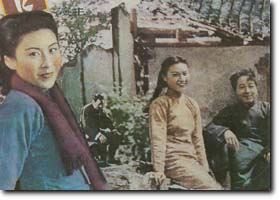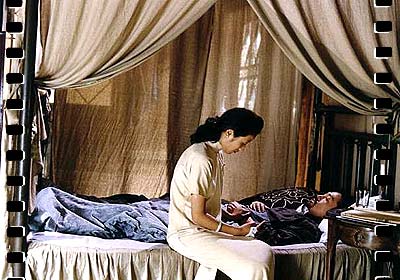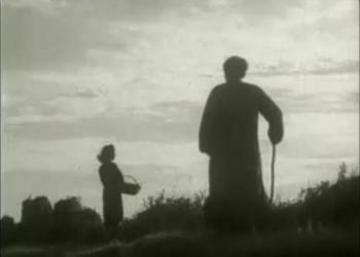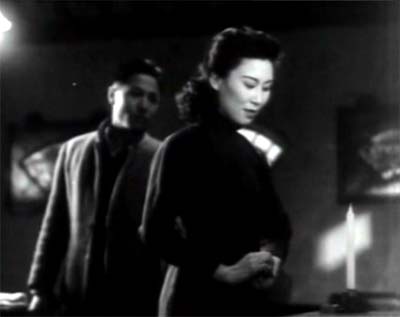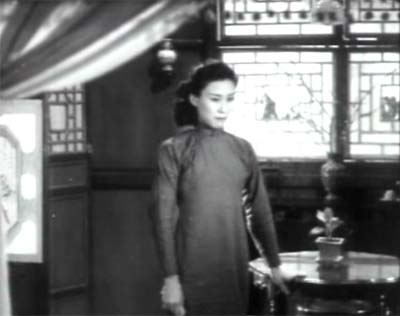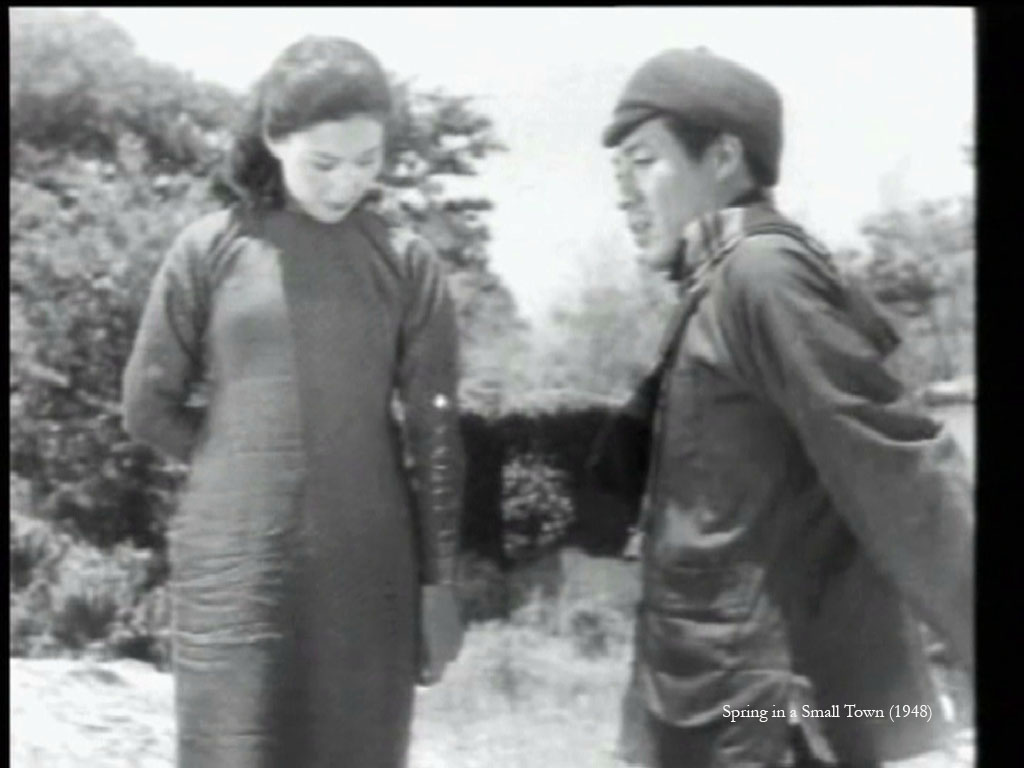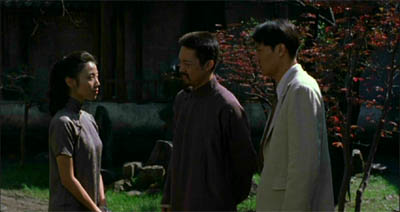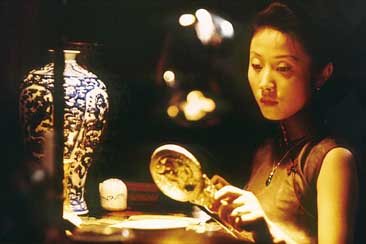From the Chicago Reader (July 9, 2004). — J.R.
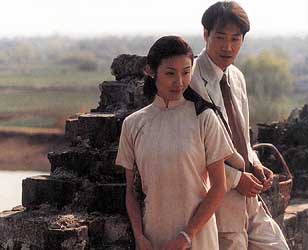
Springtime in a Small Town
*** (A must-see)
Directed by Tian Zhuangzhuang
Written by Ah Cheng
With Hu Jingfan, Wu Jun, Xin Baiqing, Ye Xiaokeng, and Lu Sisi.
It’s strange and very telling that the film most highly regarded in the Chinese-speaking world –especially in Hong Kong and Taiwan — is hardly known outside China. Fei Mu’s 1948 Spring in a Small City, as it’s usually called in English, is a film I doubt I ever would have seen if a Chinese friend hadn’t sent me a subtitled copy taken from a rare showing on SBS, Australia’s state-funded multicultural TV channel, several years ago.
Once I discovered that Fei Mu’s black-and-white film lives up to its reputation, I mentioned it casually to a local Chinese film buff, who told me it was readily available at the video store he frequents in Chinatown. Why then are English subtitled versions so scarce? After all, the film was a key inspiration for Wong Kar-wai’s In the Mood for Love (2000), which has been savored by non-Asians across the globe. And Tian Zhuangzhuang’s color remake of Fei Mu’s classic, Springtime in a Small Town (2002), showing this week at the Gene Siskel Film Center, is no less accessible.
A highly charged erotic chamber drama about unfulfilled adulterous passion, Spring in a Small City — made just a year before the communist victory in mainland China — is set in 1946, shortly after the retreat of the defeated Japanese. The film takes place in and around the ruins of a mansion in southern China. It’s part of a small town that we don’t see much of but can intuit from the heroine’s references to her daily shopping and the school her teenage sister-in-law attends.
The story has five characters. Dai Liyan, an ailing aristocrat who is the only surviving male in his family, spends most of his time brooding in the garden of the mansion, his ancestral home, much of which has been reduced to rubble by Japanese bombs. He lives with his kid sister, Dai Xiu; his emotionally estranged but dutiful wife of eight years, Yuwen, whom he married shortly before the outbreak of war and who now sleeps in a separate bedroom; and an elderly male servant. One day an old college friend of Liyan’s, Zhang Zhichen, arrives unexpectedly on the train from Shanghai. Now a doctor, Zhichen is also a former neighbor of Yuwen, who was his first sweetheart — though Liyan doesn’t know it.
Much of what follows proceeds by indirection and nuance, as Zhichen and Yuwen negotiate stirrings of their former passion. (Fei Mu — also known for the silent films he directed in Shanghai and depicted as an important character in Stanley Kwan’s 1991 masterpiece Actress — reportedly solicited the exquisite performances from his leads by instructing them with the Chinese saying “Begin with emotion, end with restraint!”) On the eve of Xiu’s 16th birthday Liyan suggests that the doctor would make a perfect husband for her once she gets older, and after everyone gets drunk at the birthday celebration many conflicting feelings rise to the surface, culminating in Liyan’s overdosing on sleeping pills.
There are certainly allegorical meanings about class, social change, and the attitudes of three generations (represented by the servant, the teenage sister, and the other three characters) that can be read into the plot — meanings that had relevance to China in the late 40s and have historical as well as contemporary relevance today. But Tian has stressed that the key to the story for him is the warmth of the emotions it expresses.

“What is sure is that some deep and true feelings are now waning away from people’s hearts,” he said in an interview two years ago. “And this is a problem for young people. They’re pretty confused. They have only vague, dim ideas about feelings, the development and nurture of human emotions. So what I found very interesting was to depict some feelings in my characters….What I wanted to analyze and what is very important for me is not the final results of their acts, but the way they deal with their feelings.”
I was worried when I first heard that one of my favorite living Chinese filmmakers, the director of The Horse Thief (1985) and The Blue Kite (1993), was remaking this classic. Remakes are always irritating to begin with, and when it comes to remakes of masterpieces — take the soon-to-be-released The Manchurian Candidate — I get ill just thinking about their existence. But in this case remaking doesn’t mean reverting to formula. I should have guessed as much: Tian has been reinventing himself throughout his career, a process that has stemmed in part from his political outspokenness, which made it impossible for him to direct a film for the decade following The Blue Kite.
That Tian can finally work again is a blessing. For Chinese viewers I imagine Springtime in a Small Town represents both a formidable cinematic challenge and a way of resituating the present in relation to the past. Tian himself, interviewed in the hour-long documentary The Making of “Springtime in a Small Town” that’s included on the English DVD of the film, says that “It was as if Fei Mu was teaching me how to make movies — the proper attitude towards movies, and how to understand and present the characters in movies.” For practically everyone else it’s a new story that can fully stand on its own.
The clearest stylistic bond between Fei Mu’s film and Tian’s remake is that both are propelled by a highly expressive mise en scene articulated in part by nearly constant camera movements that curve around the actors and settings, continually redefining their relationships. This mise en scene serves to reveal the intense feelings the characters can only allude to in isolated gestures — Liyan, in a temper tantrum, throwing down his medicine, or Yuwen, in frustrated passion, breaking the glass pane on the door that separates her from Zhichen.
Perhaps the most striking difference between the remake and the original is that Tian entirely discards Yuwen’s poetic, modernist offscreen narration, which often eerily recounts incidents that occur in her absence with telling details. Apart from this, Tian’s main changes are to film much of the action from a greater distance and bring the doctor into the story much sooner, setting his arrival in the opening sequence rather than introducing him after the other characters have been established. (One interesting convention of early Chinese cinema that’s followed in the original, possibly as a carryover from the silent period, is a subtitle identifying the actor who appears on-screen shortly after he or she does for the first time. The precise moments at which Fei Mu shows these are exquisitely selected — one sign among many others of his consummate mastery.)
Although Liyan exudes a certain pathos as the stand-in for a decadent aristocracy on its last legs and his sister figures as a kind of blank slate on which experience has yet to be written, it’s a strength of this story that all five characters are sympathetic. But the heart of the film’s passion rests in the barely expressed memories, stirrings, and longings of Zhichen and Yuwen. There are few moments as intensely erotic as the scenes between the two of them in the guest room where Zhichen is staying.
Am I talking now about Fei Mu’s version of those scenes or about Tian Zhuangzhuang’s? In point of fact, both. The most remarkable thing about Tian’s complex and wholly self-sufficient re-creation is how faithfully it honors its source without stooping to simple imitation or postmodern hommage. Though working with exquisite colors in settings that are more beautiful than in the original, Tian can’t be said to equal or surpass the 1948 film. But he doesn’t in any way dishonor it, either. Reinventing his source just as boldly as he has reinvented his artistic identity, Tian circumvents the usual mentality of remakes by making his material brand-new.
